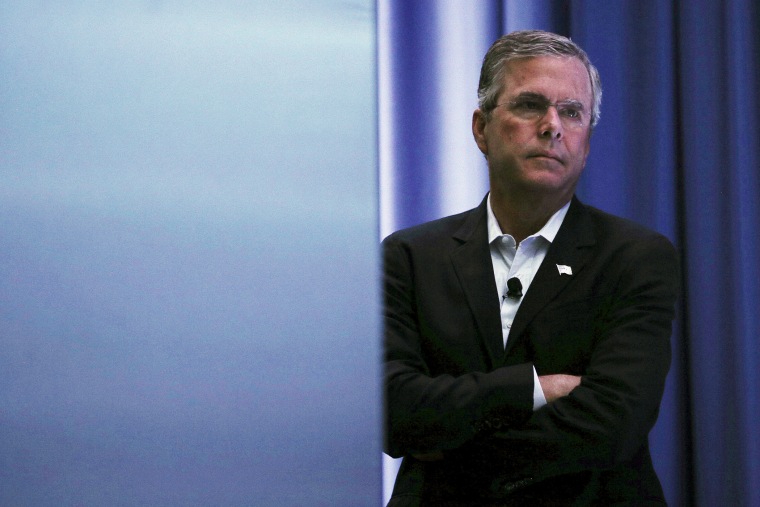When looking at a presidential primary field of 17 candidates, there's no point in applying the usual standards for who's doing well and who's doing poorly. As a practical matter, the criteria comes down to this: if a candidate's support in the polls reaches double digits, he or she is arguably faring pretty well. Those with single-digit support have some work to do.
Keep that in mind when looking at the Quinnipiac poll we mentioned earlier.
Donald Trump leads the crowded Republican pack with 28 percent, up from 20 percent in a July 30 national survey by the independent Quinnipiac University.... Ben Carson has 12 percent, with 7 percent each for former Florida Gov. Jeb Bush, U.S. Sen. Ted Cruz of Texas and U.S. Sen. Marco Rubio of Florida. [...] "Donald Trump soars; Ben Carson rises; Jeb Bush slips and some GOP hopefuls seem to disappear. Trump proves you don't have to be loved by everyone, just by enough Republicans to lead the GOP pack," said Tim Malloy, assistant director of the Quinnipiac University Poll.
Sure, in a crowded field, when one candidate is cruising well ahead of his rivals, he's inevitably going to get most of the attention. It's the blessing of frontrunner status -- you get the spotlight.
But the number that jumped out at me was 7%. That's where Jeb Bush stands as August nears its end. It's comparable to the 9% showing for the Florida Republican in the most recent Fox News poll.
Given recent history, this is arguably getting far less attention than it probably should be.
When the former governor entered the race, Bush was immediately in the top tier, and phrases like "presumptive nominee" were casually thrown around. Taking full advantage of his family network, name recognition, establishment backing, and fundraising prowess, Team Jeb hatched a "shock and awe" strategy that wouldn't just propel Bush to the front of the pack, it would simultaneously scare would-be rivals away. It worked for George W. Bush; it would work for his younger brother.
And yet, here we are. Things aren't going according to plan.
Obviously, there's all kinds of time left on the calendar and it's foolish to think Bush is finished. He may very well still end up winning the GOP nomination -- the choice of the Republican establishment usually does.
But take a closer look at some of that recent history. As we talked about a couple of weeks ago, in the 2012 race for the GOP nomination, a few different Republicans -- Rick Perry, Herman Cain, Newt Gingrich, and even Rick Santorum -- each briefly held slight leads before fading and ceding the fight to Mitt Romney.
But take another look at this chart showing national GOP polling from that race. You can see the bumps for the also-rans, but notice that Romney -- shown in the image with a red line -- was consistently a strong second, watching rivals fade in and out of the spotlight, while his support never really faltered. He bottomed out at 17% around this time four years ago, but 17% really isn't that bad.
Now consider the 2008 race, another cycle in which the Republican nomination eventually went to the "next in line" GOP candidate. John McCain certainly struggled at times, but he never fell to single-digit support.
This year, by some measurements, Bush -- despite all of the advantages and all of the assumptions about the power of his candidacy -- has a national average of about 9%, and it's falling. He's running fourth in Iowa. He's second in New Hampshire, but his support is just one-third of Trump's.
And then along comes the new Quinnipiac results, which don't just show Bush struggling, they also show Trump quadrupling the Floridian's backing, 28% to 7%. At no point in the 2008 or 2012 cycles did the eventual GOP nominees face anything like this kind of deficit.
I get the sense that for much of the political media, the focus is on Hillary Clinton's alleged troubles, despite the fact that she's far ahead of her primary rivals in national polling, and despite the fact that she leads her top Republican rivals in hypothetical general-election match-ups.
But given the relevant details, isn't the more pressing question, "What's gone wrong with Jeb?"
